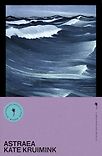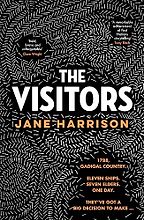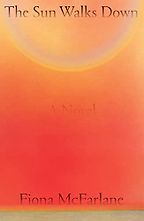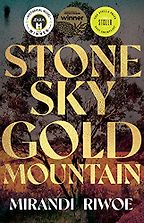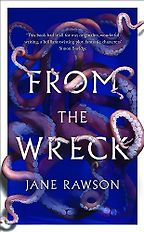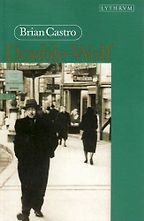Your first novel, A Treacherous Country, was set in 1840s Van Diemen’s Land—the island we now call Tasmania. Your new, Weatherglass Novella Prize-winning Astraea, takes place on a convict ship bound for the Antipodes. So what attracts you to writing historical fiction—and do you think that Australia offers an unusually evocative setting?
I do. Or, I think that anywhere can offer an evocative setting when you start to delve into the history of a place. The histories of people are endlessly interesting and relevant.
Australia, like any country colonised by the British, has white supremacy as a founding principle, which maybe brings a sharpness to Australian historical fiction, or a very particular kind of complexity as we try to reflect on how the past informs who we are now.
I studied English and History at university, and I found reading primary sources to be so inspiring. They stuck with me, but I didn’t write my first historical novel, A Treacherous Country, until I had a newborn, and I just needed escapism, honestly. So I ended up writing a story about a very posh young aristocratic man on a quest, which was the most opposite of me that I could imagine. His whole quest turns out to be this slow realisation that he is the one with all the power and agency in the world, and that maybe, if he wants to life a good life, he needs to do something with it.
My second novel was a contemporary novel, and if felt like a more personal, maybe truer, novel. But then I was drawn to this novella prize; I wanted to write very quickly to meet the deadline, and I’d been doing all this research—reading the journals of surgeon’s on women’s convict ships—and it felt like such a ripe, rich, compressed world that seemed appropriate for a novella.
Yes, I can see how this tiny society must have generated an intensity of feeling. It’s a closed circle, a group of people trapped on this ship together.
Exactly, which I think creates tension in itself.
Do you find it difficult to relate to people from a different time period? Or do you see it more as the same people in different circumstances?
Very much the latter, particularly in this novella, because it’s so stripped down in terms of setting—it really is just a group of people on a ship. I didn’t have to look into different kinds of cloth, what way someone would have walked to get somewhere—the kind of details you get caught up in when writing a longer work.
So for that reason, I think I felt I was able to focus in on the characters in a way that felt unhampered by detail. That, coupled with having read these journals, which feel really alive. These surgeons’ logbooks will give a name and a date and a summary of the complaint, how it was treated and so on, and it means you can follow a particular person’s story and see what happened to them. They’re also written with enormous bias. There’s this one woman who the surgeon referred to as “an old woman feigning madness.” I mean, you’ve got to do something, don’t you?
I suppose they had a lot of time to fill. Shall we look at your book recommendations? They are all Australian historical novels. Let’s start with Jane Harrison’s The Visitors, which reimagines the arrival of the First Fleet, the first British colonists to arrive in Australia, as seen through the eyes of the Aboriginal inhabitants.
I think it’s a really significant portrayal of that first moment of permanent settlement by the British on what is now called Australian soil, because it’s from the Aboriginal perspective, which is something that wasn’t written down—although it was, you know, passed down. So, yes, it is reimagining.
Jane Harrison is an Aboriginal woman. The Visitors began as a play, which I happen to have seen last week. In a Q&A afterwards, she said she was having trouble getting the play off the ground, so she wrote the novel in the meantime—and then the play happened. So they coexist in a way that I find quite wonderful; they come at the same story from different ways.
The book focuses on seven Elders of the Eora nation who gather on Gadigal country. They’re standing on the shore and they see the ships of the First Fleet come in. They’ve had visits in the past, but the Europeans have always left. So they take a vote: what are they going to do? Welcome them or drive them off? One votes welcome, six vote to drive off. And so the discussion begins.
What Jane Harrison, the author, was saying was that this was her thought experiment, in giving these Elders agency. Her idea, as I understand it, is to ask what the Aboriginal people would have done if they had had a choice. So she portrays that, the process of them coming to a collective decision.
That’s interesting. I know there’s a lot of discussion within history at the moment about how to deal with unwritten history. The Columbia cultural historian Saidiya Hartman, for example, writes what she characterises ‘critical fabulation’—which deploys speculative or fictional elements where the archives are silent. What role does historical fiction play?
It’s vital, because it opens discussion of ideas by presenting them in a way that feels accessible, new, and connected to our contexts today. The conceit of The Visitors is that the Elders are in corporate wear, and they have names like ‘Joseph’ and ‘Gary.’ So they have these Anglo names. The author was saying that this started with the play, because she didn’t want the actors to be ‘Othered’; she didn’t want them to appear on stage and be perceived by, probably, majority white audiences, as in her words, ‘noble savages’.
And, this is just my take, but I think we often reflect on Aboriginal cultures in the past tense, as though they are static, or something that has happened. But of course, though they are ancient, they are also contemporary. They are continuous cultures. So The Visitors plays with that idea very well, and—graciously, on the part of the author—allows someone like me, not Aboriginal, access to a more immediate understanding of things like protocols. The Elders discuss their protocols, and these are sometimes perhaps perceived as quite mystical, but by moving them into a corporate setting it draws a clear line: we all have protocols, ways of doing things that are very reasonable and fitting, and that’s the same for these Elders.
Absolutely. Well that’s a great recommendation, thank you. Can I move us on to your next Australian historical novel recommendation? You’ve selected The Sun Walks Down by Fiona Mcfarlane. We previously featured this book when it was shortlisted for the Walter Scott Prize. It’s a historical novel set in a small outback community in 1883.
Yes. The thing I love most about this book is just how wonderfully, beautifully, cleverly it’s written. The author shifts between characters in a way that doesn’t feel like she’s omniscient. She dives into the perspective of each character. And it’s so cleverly done. I keep reading it as a writer, wanting to analyse how she is doing it, but then I forget and suddenly I’m with someone else. It feels very natural!
It’s a wonderful book. It centres on a missing boy, a missing white boy called Denny. He’s six years old and has sort of created his own mythology, which is perhaps what leads him to get lost in this dust storm.
“Australia, like any country colonised by the British, has white supremacy as a founding principle”
The motif of the lost white child is very important to Australian literature. It recurs in everything—novels, children’s fiction, movies. We see it again and again. I think it reflects what we have valued as a society; it’s juxtaposed with the lost Aboriginal children of the Stolen Generations, who were lost to their families, taken permanently away as a matter of routine.
In The Sun Walks Down, the town is squatting on dust. They are trying to plant wheat and it keeps failing. They have this faith that ‘the rain follows the plough.’ They think: if we plant wheat, the rain will come. So it’s showing this fundamental misalignment, this transposing of values from one place into another entirely different place.
Your third book recommendation, Mirandi Riwoe’s Stone Sky Gold Mountain, is set during a similar timeframe, but in quite a different community.
Yes, this is set in Queensland—The Sun Walks Down is in South Australia. Queensland has more of a tropical heat than the dry of South Australia.
This book is told from the point of view of Ying and Lai Yue, two Chinese siblings. Ling is the sister, who is disguised as a boy. They’ve come to the gold fields of the Palmer River to seek their fortune. Their family is struggling with gambling debts back home in China and the two youngest children have been sold to help pay off these debts. That’s the driving force of their purpose there.
There’s a third character, Meriem, who is the servant of the town sex worker and an outcast, so all three of them are maligned by white society. It’s a very, very intense and complicated world that it gives us a look into.
I think it’s the complication that draws me to this book, and the sense of precariousness, and peril. The very fact of Ying disguising herself as a boy puts her at risk of discovery. Then there’s the romantic bond she forms with Meriem, which is tender and lovely, is also deeply perilous, even if her true sex is undiscovered—she’s apparently a Chinese boy getting close to a white girl. The Chinese are certainly oppressed, but then the white people and Chinese people are united in their brutalism of Aboriginal people.
One of the novel’s epigraphs quotes a Chinese man who wrote to his father in 1858, saying, of white people, ‘I wish to inform you that they are only strangers in this land themselves.’
A lot of Australian historical novels seem to gravitate to the 19th century. I think this period is interesting to an international audience too—it has elements of the Western—with the gold rushes and the frontier mentality—but there’s something uniquely Australian too.
For me, I’m not drawn so much drawn to the place as to the story. For me, the place serves the story. But in The Sun Walks Down the place feels so, so present.
And though foreign readers will most often imagine that quintessential outback landscape, there are many Australian climates.
You’re right about the diversity of the country. I live in rural Tasmania which is like another country from some of these other locations.
And, as Stone Sky Gold Mountain indicates, it’s been a diverse country in terms of immigrant communities too.
Yes, exactly. Although as Australia moved towards federation, that white supremacy reared its head bureaucratically again. They instituted something called the ‘White Australia’ policy, which is what it sounds like. It was an immigration policy trying to engineer a white Australia. I think because of that, maybe our national myths haven’t dealt with the true diversity of Australia, now and historically as well.
Shall we talk about From the Wreck by Jane Rawson? I’m so intrigued by this recommendation: it’s a historical novel set in 1850s Australia… but with aliens.
I find it a very exciting book. The author’s ancestor, George Hills, survived this shipwreck as a young man. She has taken that story and fictionalised it. So: he survives the shipwreck, but has this very strange embrace in the ocean with a mystery woman before he is saved. She’s gone. He doesn’t know what happened to her.
He attempts to live a normal life. Gets married to someone really lovely, they have children, and their life moves through an unremarkable trajectory, though marked by extreme grief. But there’s someone with him, and it’s not just that he’s suffering from PTSD. He’s uneasy. He has the sense that he’s been followed, and he has—by a space entity.
It almost sounds like a creative writing prompt or something, but it’s done so skilfully. This space entity takes the form of an octopus, a cat, a birthmark on his son’s neck, a woman. This entity provides an observation of this unremarkable life in a way that is unrelated to human or Christian morality. She remarks on all things as equally interesting. There’s a lovely passage, where she’s perched at a bar in the form of a woman, and she’s telling the woman next to her, like: have you tried a sandwich? Then: there’s leather, which is made of the skin of other creatures. Then: have you heard about singing? Sometimes everybody knows the words and they all say them together.
It’s just a lovely, deeply non-judgemental observation which casts normal life into a kind of strangeness. I came to think that maybe it is the alien that is the authorial voice.
So interesting. How would you characterise it for a reader? Is it a literary book, a genre book?
It’s a literary book. I mean, it did win the Aurealis Prize, which is the science fiction/fantasy award here. But it was also shortlisted for the Miles Franklin Prize, if you know about that.
It’s probably the most prestigious Australian literary prize.
Right. So it kind of straddles both. I absolutely recommend it.
Thank you. The final book on your list of Australian historical novels is Brian Castro’s Double-Wolf. And I’m also fascinated by this—it takes an interesting structure, with a dual timeline. Can you talk us through it?
Even a triple timeline. So it takes place in the late 1970s in Katoomba in the Blue Mountains, a place where people go to recover and rest. Also Vienna in the early 1970s, and pre-revolution Russia. It’s the story of one of Freud’s most famous patients, who was called the ‘Wolf Man’ because of this really significant dream of white wolves that he had as a boy.
Honestly, I don’t really understand this book, but I’m incredibly compelled by it. I find it very interesting, and I love that it’s about something so different. Why not write a book about the Wolf Man and a strange, perhaps, con artist who is writing about him and tracking him through history?
The entire book is parenthetical, so it begins with an open bracket and ends with the close bracket. Again, I don’t know why. Perhaps it suggests that all these ideas of psychoanalysis and duality—that the book is confined to the realm of the psyche—that maybe none of what the author is suggesting is real.
I love that: ‘I don’t understand it but I’m very compelled by it.’ Maybe, to close our discussion, you’d talk a little more about your own new novella, Astraea, which is shortly to be published by Weatherglass Press.
So I mentioned that it started from the surgeons’ journals, which are obviously from a man’s point of view. I was more interested in the women’s points of view. There was a massive gulf between the surgeons and the women. The surgeons were medical men, highly educated, some of them were titled. They not only had medical authority but also a kind of moral authority over the women on the ship. They would create rules, they would hold women responsible and deliver punishments. There was one who, it was said, gave “a paternal embrace” when a woman repented.
So it felt to me like absolute vulnerability. If this man happened to be someone principled, it might be okay. If not, well, good luck. And there was the extra vulnerability in many of these women having children with them. They were mostly young women, single mothers, in these terrible confines with high infant mortality rates—versus these men of standing.
The surgeons were half-medieval in their practices. There was blistering and bloodletting and, I think, an unnecessary number of enemas. Things that the mothers might naturally say no to, if they were being offered to their child as treatment. But, reading through the journals, I was struck by how the surgeons would ultimately acknowledge the right for the women to advocate for their children. They would do it begrudgingly, but they would do it. That cast what seemed at first look like a very black and white situation into something far more complicated.
The novella is centred on a girl who is so traumatised she’s consciously cut herself off from memory and from anticipation of the future. This is her way of surviving: she focuses very deliberately on her present moment. So the entire novella is on this small wooden ship in the middle of some ocean, presented through the eyes of someone who is wilfully denying herself any context. This means she has to piece together who she is in relation to all these people almost anew.
Sometimes when I speak to writers of historical novels we talk about what a particular historical period or narrative might tell us about today. Do you think this is a role of historical fiction—that we should pick stories that represent commentaries or analysis of the present moment?
Certainly, but perhaps that will happen anyway, no matter what the story is, if it’s told with a degree of real engagement and reflection. Just interpreting the story and presenting it to a modern audience is drawing a connection, isn’t it? Holding a mirror up?
Interview by Cal Flyn, Deputy Editor
August 16, 2024. Updated: August 20, 2024
Five Books aims to keep its book recommendations and interviews up to date. If you are the interviewee and would like to update your choice of books (or even just what you say about them) please email us at [email protected]
Five Books interviews are expensive to produce. If you've enjoyed this interview, please support us by donating a small amount.

